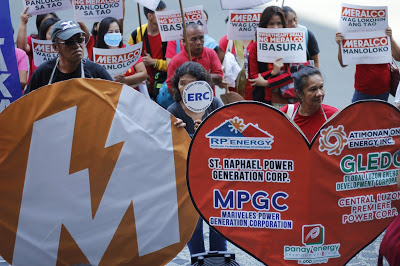Consumers, civil society groups rap Meralco on ‘sweetheart’ deals

Consumers and members of civil society groups converge Tuesday to protest what they claim are anomalous Meralco power deals. CONTRIBUTED PHOTO
Electric consumers with civil society groups on Tuesday held another protest rally in front of the Energy Regulatory Commission (ERC) and Meralco main offices to expose what they claimed were Meralco’s anomalous power supply agreement (PSA) applications.
The rallyists, led by members of the Power for People Coalition (P4P), Sanlakas, the Freedom from Debt Coalition (FDC), the Philippine Movement for Climate Justice (PMCJ), and the Center for Energy, Ecology, and Development blasted Meralco for virtually “dealing with itself” by entering into PSAs with companies which it has large shares of.
“With a contribution this big, this company must have strengthened its commitment to be faithful to its consumers in solving our energy crisis. However, it seems that they have been fooling behind our backs together with their ‘sweethearts’,” said Butch Junia of the Power for People Coalition.
Meralco has denied allegations that it obtained favored deals from the ERC which was accused of granting “midnight deals” to the distribution utility.
During the House of Representatives inquiry into the alleged midnight deals last month, Meralco regulatory management office head and first vice president Ivanna Dela Peña said the seven power supply agreements (PSA) submitted to the ERC for approval were intended to provide the cheapest cost of electricity.
Article continues after this advertisementDela Peña added that Meralco’s power supply deals were intended to shield consumers from higher prices at the Wholesale Electricity Spot Market (WESM).
Article continues after this advertisementClear connivance
The current Electric Power Industry Reform Act of 2001 (EPIRA) allows the distribution utility to contract with affiliated generation companies at 50 percent of its total demand. However, based on Meralco’s 2016 Annual Report, its PSA partners are actually their subsidiaries, associates and/or joint venture partners.
Thru MGen or Meralco PowerGen Corp., Meralco’s fully owned subsidiary has major investments in Atimonan One Energy (A1E); 50 percent in St. Raphael Power Generation Corporation (SRPGC); 49 percent in Mariveles Power Generation Corporation (MPGC); 47 percent in Redondo Peninsula Energy Inc (RPE); and 14 percent in Panay Energy Development Corporation (PEDC).
“This is nothing but a clear connivance between Meralco and the said generation companies—a deal made out of mutual benefits and equal exchange of favors, just like how ‘sweethearts’ do,” said Erwin Puhawan of FDC. “If the PSAs would push through, Meralco would have freedom to exercise influence over the cost of both the generation and the distribution of electricity.”
Continued betrayal
“What is clear is that consumers will end up carrying the cost of these incestuous deals, with Meralco profiting from both ends of the power sector,” said Gerry Arances of the Center for Energy, Ecology, and Development. “This undermines any semblance of commitment by the government to increase energy access in the Philippines, and will only reinforce the electricity oligarchy in place in the country’s energy sector.”
Meralco has earlier responded negatively to these accusations, saying they are being singled out from among the companies which submitted PSA applications. This prompted protesters to say that Meralco was just playing the victim’s card.
“We are not singling them out. It is true that there are 90 applications submitted and only 9 of them are from Meralco but we should take note that in terms of demand it is 3,551MW out of a total of 4,500MW, making it 78 percent of total demand. That means that 7 percent of total PSAs own 78 percent of total demand,” said Sanlakas Secretary General Atty. Aaron Pedrosa.
The protesters also added that it was very unusual and worrisome that this had gone unnoticed with ERC seemingly unconcerned. “We urge the ERC to slam the PSAs and break up this abusive relationship between Meralco and consumers,” Pedrosa said. “We cannot have a relationship based on lies,” he added.
Meanwhile, PMCJ National Coordinator Ian Rivera said these partnerships can make or break the environment’s future. “These sweetheart deals are mapped-out destruction of our environment bringing us five steps backwards in achieving sufficient, affordable and clean energy.”